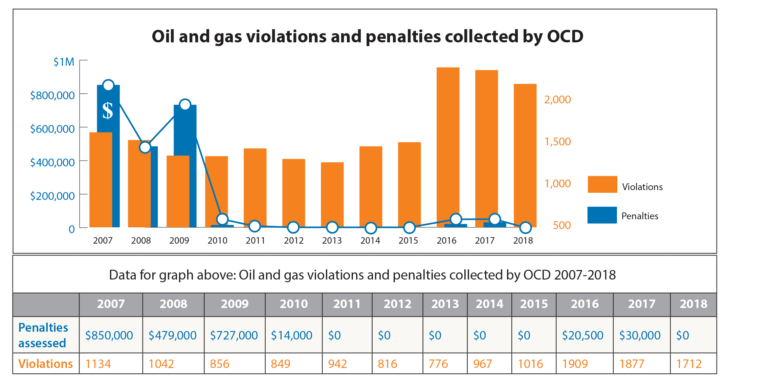Media Contact:
Hilary Lewis, (202) 887-1872 x101, hlewis@earthworks.org
Albuquerque, NM — New analysis shows a dramatic drop in penalties for violations of New Mexico’s bedrock oil and gas law and an equally dramatic increase in spills following a 2009 New Mexico Supreme Court ruling. This case brought by the oil and gas industry resulted in the stripping of enforcement authority for New Mexico’s Oil Conservation Division (OCD). For instance, the OCD did not issue any penalties to the oil and gas industry in 2018 despite finding thousands of violations, a report released today by Earthworks finds. Today’s announcement of new legislation to re-authorize OCD to assess penalties will help deter illegal pollution and protect New Mexicans and their vital resources.
New Mexico’s Moving Ahead: Restoring the Oil Conservation Division’s Strength and Authority recommends the state:
- Restore OCD’s authority to assess civil penalties for violations of the New Mexico Oil & Gas Act
- Strengthen OCD enforcement capacity by increasing the number of OCD inspectors
- Establish consistency and transparency in the assessment of violations and penalties, and communication of oil and gas spills
“Restoring New Mexico’s authority to enforce our own laws is the best way to improve the health and safety of all New Mexicans,” said John Barry, Carlsbad, NM. “9 years is too long for a free pass at polluting our air, poisoning our water and risking our health. This commonsense proposal will simply make it cheaper for industry to comply with the law than to break it.”
New Mexico’s Moving Ahead uses publicly available state data to update Earthworks’ 2012 report that found that the 2009 New Mexico Supreme Court ruling removing OCD’s enforcement authority and requiring the AG’s office to pursue penalties only through court proceedings significantly curtails application of state rules, industry compliance, and deterrence of infractions. This situation is made worse by the lack of OCD inspectors and oversight resources.
These two trends have converged at a time when oil and gas development is rapidly accelerating in New Mexico and has reached a much higher level than prior to the 2009 court ruling. The total number of oil and gas-related spills increased nearly 100% since 2008 and more than 500% since 2000, but penalties in 2018 were $0. Currently, only about 63% of oil and gas facilities are inspected by OCD, up just 3% from 2012. Increasing that percentage, by adding inspectors, is likely to increase violations and, with OCD’s reinstated authority, increase penalties and revenue for the state.
“State enforcement procedures are hamstrung by underfunding and lack of authority,” said Nathalie Eddy, Earthworks Colorado and New Mexico Field Advocate. “Restoring the ability of state regulators to do their job will ensure that New Mexicans and our vital water resources have the protections they deserve.”
FOR MORE INFORMATION
- SB 186
- SB 186 Factsheet
- Enforcement Report: NM OCD (2012 Report)
- New Mexico’s Moving Ahead (2019 Report)

